Magnesium threonate has so many benefits, including aiding with migraine brain fog. This article will explain the benefits of magnesium threonate and how to use it to improve cognitive function.
The information presented here is purely informational and all supplement changes should be reviewed with your health practitioner before use.
Magnesium L Threonate Benefits
Magnesium has been shown to decrease migraine symptoms in general, but often we forget that different types of magnesium are helpful for different areas. Magnesium Threonate is one of the best for neurological issues, particularly because it has a high absorption rate and can penetrate the blood-brain barrier.
One particular study found it's helpful with memory decline, Alzheimer's disease, and enhanced learning in young rats. You’ll often see some kind of “neuro” or “cogni” in the name based on the research that supports its ability to help with cognitive and neurological functions. Magnesium L Threonate benefits include:
- Aids with cognitive function and promotes a "clear head".
- Helps with migraine prevention.
- Reduces migraine brain fog common with vestibular disorders, as well as vertigo.
- Some find it energizing as a caffeine replacement.
- Can aid with depression.
- Crosses the blood brain barrier, restoring magnesium directly to the brain.
Research shows magnesium to be a critical player in the activation of nerve channels that are involved in synaptic plasticity. That means that magnesium is critical for the physiological events that are fundamental to the processes of learning, memory, cognitive function and for healthy mitochondria. It is highly absorbable and has the unique ability to permeate the brain and enhance the receptors that are involved in this process.
Magnesium L Threonate is said to be the only form of magnesium that crosses the blood brain barrier and significantly increase the levels of magnesium within the brain - exactly where people with migraine need it!
Magnesium for Vestibular Migraine
One of the ways vestibular migraine hit me hardest was with cognitive function. Before my symptoms began I had a quick wit and often managed the work of multiple people at my job.
When my chronic illness began, I couldn’t even think of small words like “dinner” without having to pause and think incredibly hard. I’d be having a conversation and would get hung up on what I was trying to say, racking my foggy brain for basic words. Often I wonder if the anxiety I felt from this exacerbated my symptoms. I felt stupid. There were also points where I had some short term memory loss and would misplace things regularly or forget conversations. These are all symptoms of migraine and some vestibular disorders, specifically vestibular migraine.
While this supplement is expensive, I thought I would give it a fair trial of at least a month before I refilled the supplement. I noticed fairly quickly after I would take Magnesium Threonate in the morning that I had more energy and mental clarity. As time continued, this was a common occurrence. My morning brain fog is eliminated and I am more alert without caffeine. It is a part of my treatment plan to this day - I take two capsules of Cognimag in the morning!
Magnesium threonate can be helpful for vestibular migraine because:
- Brain fog and memory loss is common with this type of migraine.
- It can reduce dizziness and fatigue.
- It contributes to the overall amount of daily magnesium you can take for migraine prevention.
- Outside of magnesium glycinate, threonate is one of the best forms of magnesium for vestibular migraine.
Because this supplement can be expensive and the recommended dosage for migraine prevention in studies is 400mg, it is best to mix and match with another less expensive form of magnesium to get the full amount needed.
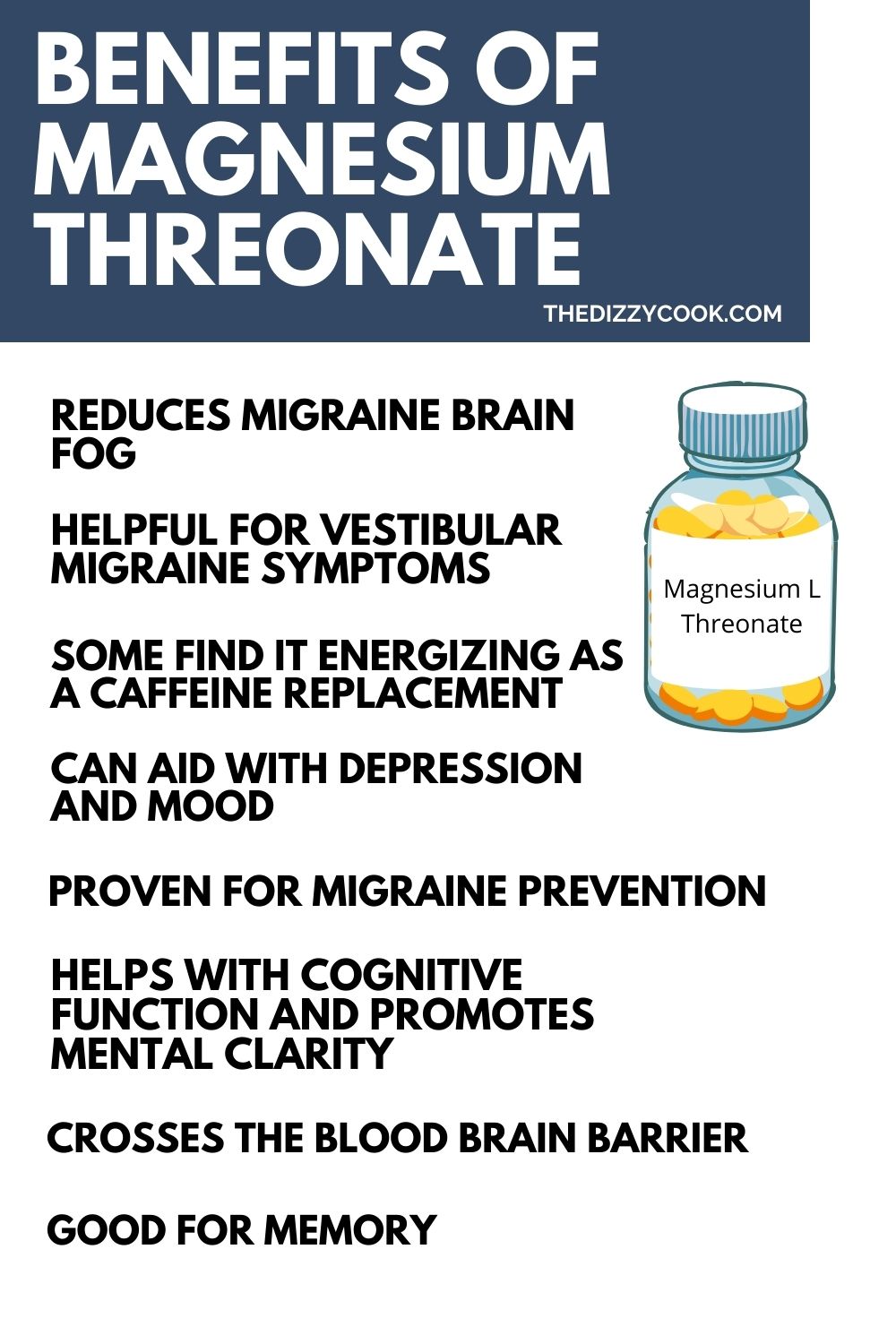
Types of Magnesium Threonate
Here are a few types of magnesium l threonate that I have personally tried.
1. CogniMag by Pure Encapsulations
CogniMag contains the patented product called Magtein, developed by researchers at MIT including a Nobel Prize winner. The total amount of magnesium is 72mg. It also includes a proprietary blend called PhytoMemory which includes blueberry and strawberry extract, as well as spinach juice. Extremely limited on fillers, this is my personal supplement and one I recommend as the best option. 95% of my readers report some kind of success taking this daily. You can also get an exclusive discount.
2. Neuro-Mag by Life Extension
Neuromag also contains Magtein but has a few more fillers listed in ingredients (it is also less expensive. Overall you get 144mg of magnesium threonate in this supplement. If cognimag is ever on backorder, this is the one I use. This neuromag is also available at a discount.
3. NeuroMag by Designs for Health
This NeuroMag is chelated magnesium threonate and another brand I used when Cogimag was out of stock. NeuroMag has very few fillers and also contains 144mg in the daily dosage. This is not available on Amazon right now, but can be found in my supplement store. This is also generally less expensive than cognimag.
4. Less Expensive Alternatives
Several readers have emailed me to update me on their favorite brands that are a little less expensive than the ones above.
Magtein ($22)
Jarrow Magnesium Threonate ($26)
Discounted Magnesium Threonate
Magnesium L Threonate UK brands:
Dr Mercola & Life Extension

Reviews on Magnesium Threonate
"I wanted to drop you a line to say that adding magnesium threonate has been a major game changer. It clears up the heavy head feeling I have when I wake up. The change has been remarkable" - Aimee
"I started taking the Magnesium Threonate close to 2 months ago. When I had to increase my dosage of Nortriptyline to 50 mg I noticed I was fuzzy headed all the time. I added the Magnesium Threonate and I am in pretty good shape now and I have had to increase my dosage of the Nortp to 75 mg to boot. It has made a big difference. But basically after I read page on supplements I now take both Magnesium's, B2, CoQ10 and Ginger everyday. The whole package works well...For me I have had to find alternative brands because the Pure Encap are too expensive." - Nancy
Migraine Supplement Articles
For more articles on supplements that benefit migraine disorders, check out these posts.
This post was originally published August 30, 2018 and was updated December 3, 2021 with new information and an infographic.

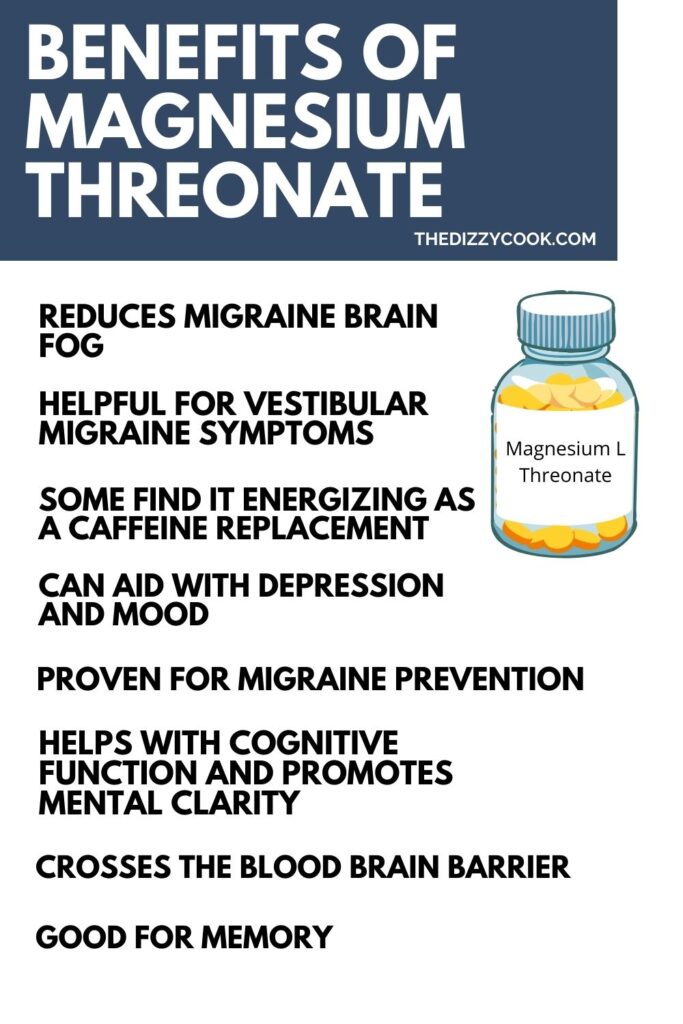
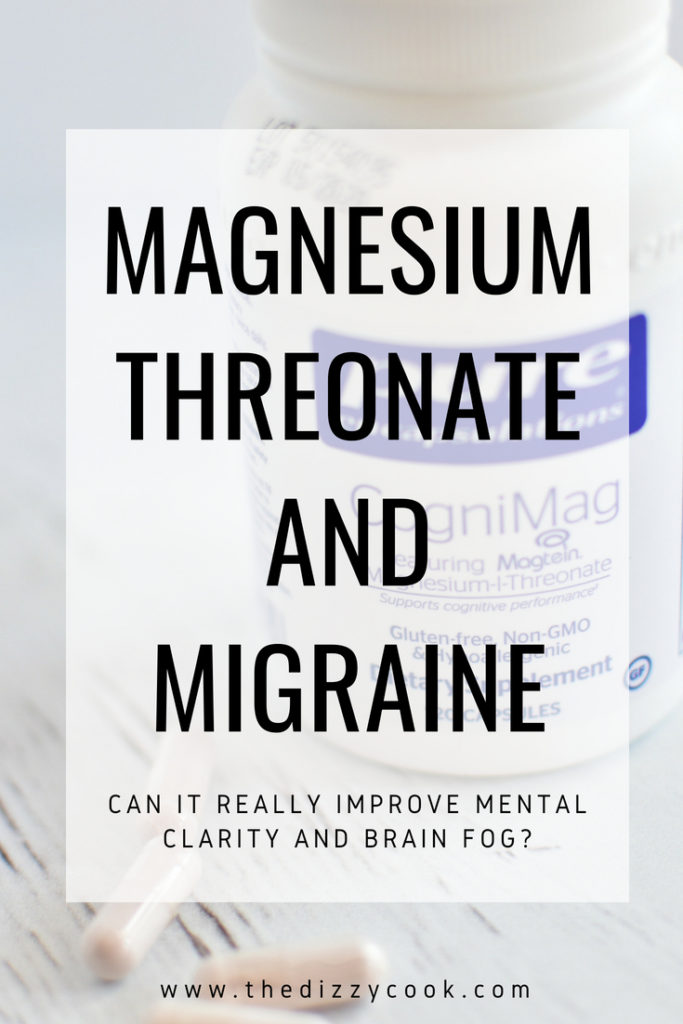
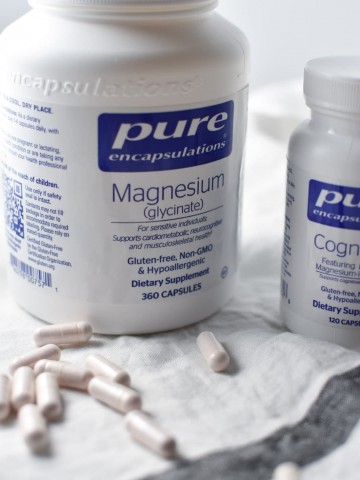

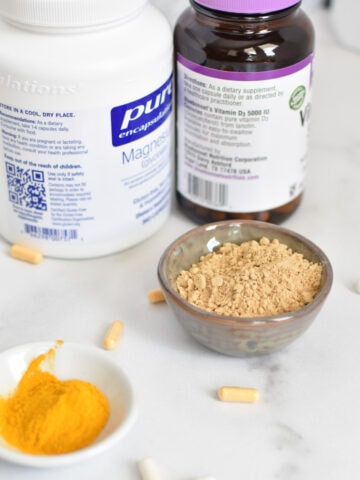
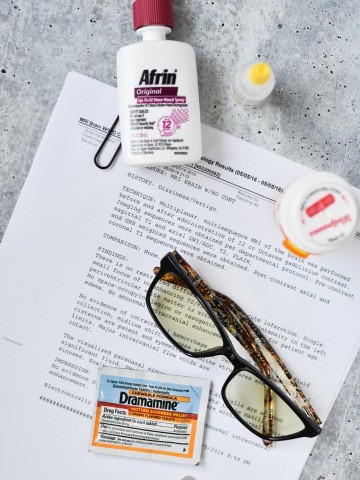

When I go to buy from the supplement store, it wants me to upload credentials. How can I buy without that?
You can't. These discounts aren't allowed to be public. I don't use your email for anything and you'd just get emails occasionally on sales from the store, which I'm pretty sure you can opt out of.
How much of the Neuromag do you take that works for you - the 144 mg is that sufficient or do you need double that dose? Also, how quickly did you see results from Magnesium L threonate and the glycinate? I have heard 6 weeks but hoping helps fog earlier.
Is it okay to take vitamin D and magnesium at the same time (after breakfast)?
Thanks for the info. I've been taking Neuro-Mag for a few months (brain fog) and unfortunately haven't noticed a difference. My doctor told me that in order for magnesium to be properly absorbed, you need to take twice the amount of calcium as you take magnesium, but at least 2 hours apart. Are you familiar with this advice and/or do you take a calcium supplement? I'm wondering if the Neuro-Mag isn't working for me because I'm not taking enough calcium... Thanks in advance!
Hey Julie - It's the calcium that needs magnesium to be absorbed. Calcium can compete with magnesium if taken at the same time, so you would want to separate them, but you don't need twice the calcium to absorbed magnesium. I don't even take a calcium supplement. If neuro-mag isn't working for you, definitely try the cognimag. I get the best results with cognimag myself.
That makes much more sense. Thanks so much!
You're welcome!
Thanks so much for all this wonderful information! Quick question - I don't do well with swallowing particularly large pills - do you know if this is one you can pull apart and add the powder to water/juice?
Thanks for all this info! I've been taking Migrelief (original formula) for years but now that I'm trying the HYH diet and working for better migraine control I'm curious to re-visit this as well if there are things that would work better. I also take Centrum but not sure if that's the best or if there's anything cleaner/better?
I have regular chronic migraines (not vestibular) and also feel like I have brain fog much of the time. From what I've gathered from a few of your articles it might be good to try:
CogniMag (what amount? any other magnesium also or is this alone good?)
B2 (how much?)
COQ10 (how much?)--I tried this years ago and wondered if I wasn't feeling well on it so stopped but might try again
Vitamin D (how much?)
Anything else?
Thanks so much for your website and FB group--I've learned so much already.
Hey Kristen, this post on migraine supplements is helpful for general dosages, but it's important to run everything by your doctor as they may have different suggestions. I only take 72-144mg of the magnesium threonate and supplement other magnesium to get in the 600-800mg my doctor recommends for me.
Hi, I started cognimag a few days ago. I was hoping it would help with alertness since I’m not drinking coffee anymore, but I feel like it has actually made me feel more fatigued. Did you experience this and does it eventually get better?
Did you just quit coffee? If so, that could be the reason behind the increased fatigue. Some people do notice that magnesium overall is very calming so maybe it calms you more than energizes (even if it does the opposite for me!). In that case you may want to switch to taking it in the evenings. We are all so different so you kind of have to figure out when is best for you!